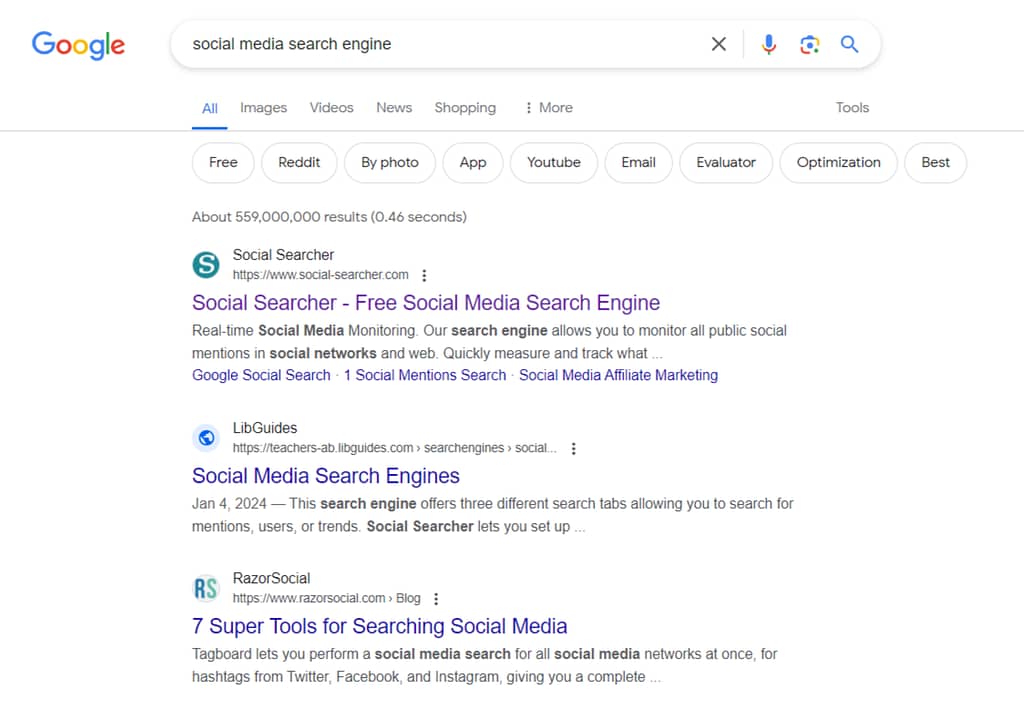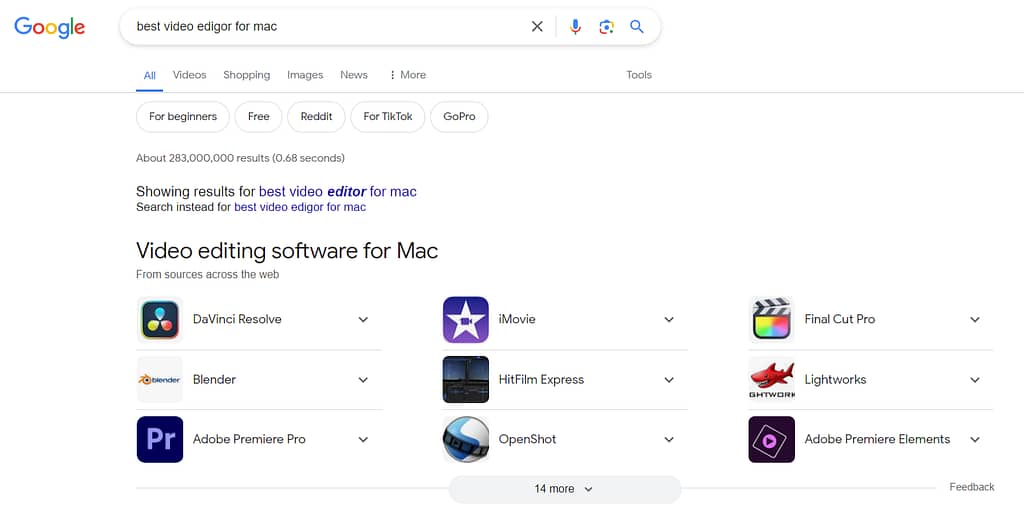Posted 04.24.2024 by Josh Krakauer
Social Media Search Engines and the Rise of Social Search
Native search on social media is getting more relevant - join us to explore the reasons and insights behind social search.
Have you ever searched for a product recommendation on Instagram or TikTok without ‘googling’ it first?
If you didn’t, you’ll soon be an outlier.
Social media has been used for many things over the years — to generate brand awareness, share updates, and build communities — and now it’s evolving into a source for answers.
In other words, social platforms are becoming credible search engines, challenging Google’s dominance over internet search since Yahoo! did it a long time ago in a galaxy far, far away…
The tell-tale signs are all over the place.
Google’s leadership publicly acknowledged this shift in user behavior back in July 2022, and the company’s 2024 agreement with Reddit hints that the trend is very much real.
TikTok is on board too, citing the trend as one of the main reasons behind their Search Ads Toggle feature, which allows brands to advertise on TikTok search results.
So, why are social media search engines so important?
How are they different from Google or Bing?
And most importantly, how can brands leverage social search?
Let’s start by looking at social media search engines from the ground up.
What is a social media search engine, and what is social search?
Although “social media search engine” sounds like a self-evident term, confusion can ensue…if you google it.
As you can see in the screenshot above from early 2024, the top 3 results point to tools/services that allow us to simultaneously search for terms on social media platforms.
I don’t know about you, but that’s not the first thing that comes to mind when I think about using a “social media search engine”.
So, what does instead?
The native search capabilities that every social media platform uses to surface answers.
For example, here’s X’s search bar, an example of an actual social media search engine.
To conclude, the act of using these search engines is known as “social search”.
Simply put, if you perform a search using a native social media search engine, that’s social search right there.
What are the differences between traditional search engines and social search?
The main difference between social search and using a traditional search engine is pretty straightforward: The social media search engine will only fetch results from users generating content within its walls.
On the other hand, a search engine like Google can, and will index results from all over the web, including from platforms like Reddit, TikTok, and YouTube (but not Instagram!).
Aside from this, there are other differences, which are mostly features provided by traditional search engines, but not by social search ones – and vice versa.
For example, Google allows you to search and filter results by custom date ranges (and so does X’s search engine) but you can’t do that on Reddit.
Another example is Google’s spell checker, which helps the search engine yield intended results for words that are typed incorrectly.
On the other hand, if you misspell while searching on X or Reddit, the results just won’t pop up…yet.
The impact of social search on consumption habits
Okay, let’s hold our horses here.
First, the search market share is still in Google’s favor, with ~90% of all searches going through their search engine.
Second – while studies indicate changing trends, it’s still hard to make predictions, at least until the dust settles.
In other words, there’s interesting evidence out there, but not yet conclusive.
For example, there’s evidence that Gen Zers (born between 1997 and 2012) prefer searching for information on TikTok and Instagram than on Google – a clear, significant shift in user behavior powered by social search.
There’s more, of course.
According to research services provider Material, TikTok users are 15% more likely to use TikTok to research new brands or products – and a full 55% of TikTok users do so.
It doesn’t stop there: 58% of TikTok users discover new brands and products on the platform, while 47% of TikTok users also look to convince others to buy products they find in the app.
All of this sounds impressive, but when it comes to (average) conversion rates, Facebook and Google still top the charts, followed by TikTok, Instagram, and X.
And even so, these conversion figures are unfair, because Google does convert almost entirely from search but the rest of the platforms don’t.
We’d love to have some fresh data on social search conversion rates as the market keeps moving, but it’s not yet available.
So, what’s our take here?
Even though Google is still the major force when it comes to search, it’s clear that social search is becoming more relevant by the day, and that positive results will turn the market into a more competitive space.
On top of this, when you target certain industries and age groups, striving to rank high on social search results is a no-brainer.
Social SEO: How can brands leverage social search?
One of the most interesting things about social search is how it reduces the distance between traditional search engines and social media platforms.
So, what we’re seeing now looks like a natural progression (or perhaps a deepening) of user preferences that were already there.
In other words, users are leveraging the features of their favorite social platforms, and the platforms are improving these features to keep them happy and engaged.
Let’s not forget that the entire business model behind online search is a mix of discoverability, accuracy, and value.
As a brand, you want to be discoverable, interesting, and valuable for countless user queries as well – that’s one of the main reasons why websites exist, to serve users with content that solves their inquiries.
In social search, these SEO principles remain the same with a few key differences:
- The equivalent of your website on socials are profiles, pages, and groups – that is, properties that you can control on social platforms.
- A social media search engine will display content mentioning and/or coming from your brand as long as it is available on the platform.
- User-generated content about your brand (positive or negative, sponsored or organic) is incredibly relevant on social search and carries the potential of virality.
- Engaging with users as a brand is not only possible but valuable. The comment is the content and does not go unnoticed.
- Keywords and keyphrases (branded and non-branded) are of top importance in social search, but top results change faster and more often than in traditional search.
So, how do we leverage social SEO?
Again, it depends on the brand and its target audience, but it’s always important to:
- Keep updated brand profiles.
- Use and include the keywords that match your brand (including values, offerings, and so on) consistently across the board – not just in posts, but in your profile’s “about” sections, in employee advocacy programs, and so on.
- Engage and try to provide value when the situation calls for it. Social media gives many opportunities, as people ask, comment, and interact on any topic constantly.
Needless to say, these are general tips.
Each brand will have to consider specific strategies and tactics depending on their industry, target audience, preferred social networks, and so on.
Where are social media search engines going?
From what we’re seeing out there, it looks like social search is following the path of traditional search.
That means two things: More features and monetization.
TikTok and YouTube already offer advertising space in search results, and Instagram is slowly rolling out the same for its platform.
At the same time, better search experiences via added features are also in the books – or at least, that’s what we’d expect, given that some social search engines are still pretty thin when it comes to useful features.
The intended result looks logical: If users are using your search engine, it’s almost an obligation to improve the experience of search and provide the necessary value to monetize it.
It’s clear on paper, but we’ll have to wait and see if the social platforms can offer the kind of value Google has been delivering for the past 20 years.
Is social SEO part of the social media strategy?
Absolutely, and it’s always been.
The moment you set up or update a profile on socials, you’re basically trying to optimize your presence and discoverability on a platform.
However, as social search gains steam, so will keyword-driven and content-driven optimization of branded and non-branded content.
In other words, the content part within the broader social media strategy will have to reflect optimization efforts to drive traffic coming from social search towards your properties (i.e. profile, posts, comments) within such platforms.
Conclusion: Social search and the power of human touch
While changing user behavior obeys a certain logic (an extended use of the platforms we spend the most time at), there’s also an external component behind them.
That is the perceived decrease in the quality of search results served by traditional search.
Conversations around this subject take place every day, and it is true: There are countless searches for which results are too artificial, too sanitized, or plain low-value.
Spam is rampant too, and the so-called “authoritativeness” factor is diluted once you realize how the main search engines serve top results from websites that have nothing to do with the subject matter at hand.
Social media, on the other hand, allows for spontaneous, salt-of-the-earth interactions that feel more real, and serve the same purpose: Giving us a trusted, valuable answer for what we search for.
And that’s important because we value the human touch and the use of language that sounds natural.
Information retrieval is still very much Google’s domain, but when it comes to news and discovering new trends, products, and services, it’s social media platforms that are making the most progress.
And in some cases – like TikTok, Reddit, and YouTube – you can get both great information and follow trends and news at the same time.
Interesting times are upon us, and social search will surely be front and center for us marketers.



